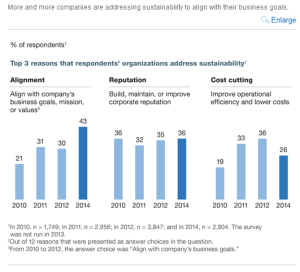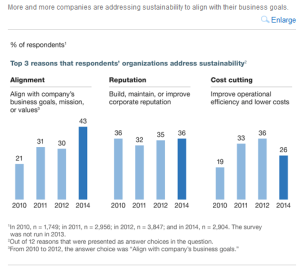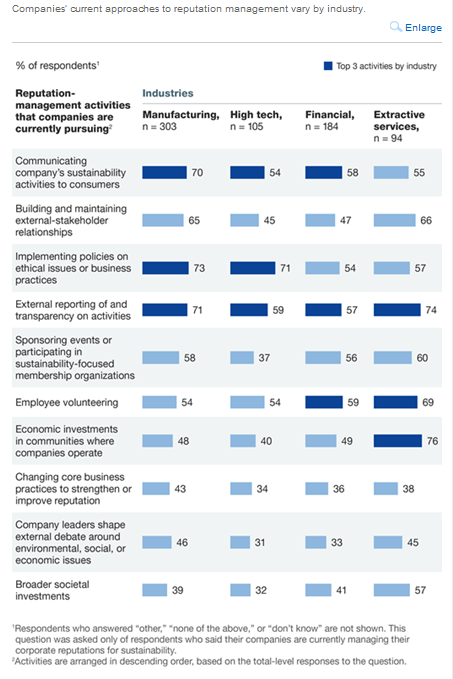Sustainability is becoming a more strategic and integral part of their businesses for company executives, according to a survey by McKinsey. The 3,344 executives who took part give three reasons for this: align with the business goals, mission, vision and values (43% of respondents, compared to 30% in the previous survey); reputation, which as in previous years continues to be an important reason (36% and 35%, respectively) and cost cutting (26% and 36%).
However, there are still significant challenges related to putting sustainability into practice. To be more specific, the respondents cited the absence of incentives and short-term earning pressure that conflicts with the long-term nature of these issues.
THE VALUE OF REPUTATION
Regarding the sustainability activities that companies are carrying out, executives most often refer to reducing energy use and waste in their operations (64% and 59%) and to managing their corporate reputation (59%). The latter is identified as essential and the one with the highest potential to create value for their business over the next five years.
However, there is a lack of clarity in relation to reputation management compared to other activities that are much better defined, such as reaching new markets with sustainable products, and each sector understands and values reputation in a very different way. When the consultancy firm asked executives what actions they take in this respect, the general response was that they communicate their activities to consumers and maintain stakeholder relationships. These actions are followed by implementing policies on ethical issues or business practices and external reporting.
LOOKING TO THE FUTURE
In order to progress, McKinsey recommends three lines of action:
- Extend the product life cycle: the firm sees huge value potential in better design and in the optimisation of products for multiple cycles of disassembly and reuse. Forward-looking companies should begin investing in the “circularity” of their products, for the benefit of society and for their bottom line. On materials alone, companies could potentially save more than $1 trillion per year.
- Make better use of technology: in a world with limited resources, technology can help capture value. However, only 36% of respondents said that their companies are fully or mostly integrating sustainability into their data and analytics work.
- Focus your strategy: as sustainability becomes more important to businesses, companies should align internally on the measures that they want to put into practice. The firm recommends defining no more than 5 clear priorities as one of the key factors for successful sustainability programmes.
ACCESS THE MCKINSEY SURVEY HERE










